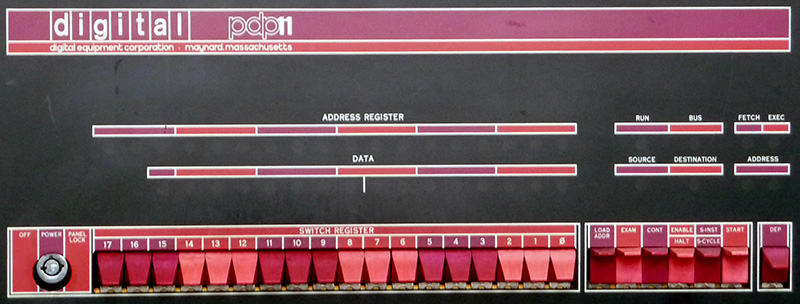During a recent discussion with my grandson, Kenneth regarding his upcoming course on Linux, I got to thinking about how my involvment with computers has followed the history of computing. That prompted to me to Google some of the details, which led me to this link this morning on Unix. It was written by Dennis Ritchie, one of the two primary developers of Unix. There I learned that the name Unix was meant by one of the team members, Brian Kernighan, to be a bit of a slam on Multics. That project had turned out to be a failed effort on which they had worked that involved a huge number of players from various companies. Could this have been a perfect of too many cooks spoiling broth?
It is amazing to think about the computer they were trying to get their management at Bell Labs to buy, one they needed in order to develop the new operating system they had come to believe was necessary. It is important to note that Bell Labs’ mission, especially in 1969, had to do with things like satellite abd other new telecommunication technologies, and not in developing computer software. Basically, they worked in the research division of the original and primary telephone company of the United States, Bell Telephone. The company had been founded in 1876 by the inventor of the telephone, Alexander Graham Bell himself!
Here are a couple of photos of the type of computer they were trying to buy:
You can see those photos and some others at this Web site of the Living Computers Museum+Labs Think about how that computer had maximum memory size of 1,152 kilobytes (Wikipedia article on the PDP-10), a tiny fraction of what is in a Raspberry Pi 4 with 4 GB of memory. (That reflection brought me to calculate the size difference between the two. The tiny, credit-card sized RasPi4 4 GB has 3,472 times more memory than the computer pictured above!
Discovering that Web site was great fun in itself. It was founded by the late Paul Allen, co-founder of Microsoft with Bill Gates. Now I have to convince my wife to go to the museum in Seattle when it reopens after COVID! ?
All of that got me thinking about something else that Ritchie developed. It turns out that one of the first programs they created for the PDP-7, a predecessor of the DEC-10 was the game, Space Travel. The Wikipedia article very closely describes the first computer game I ever played, which was at the Air Force Academy. I can’t remember the exact date for sure, but it that would have been in 1976 or so when I was first assigned there. It could also have been in 1980 when I returned to the Academy from Ohio State. To play the game, it was necessary to load the program using paddle switches like you see below. The user would set up the memory address and contents using the switches and then flip a switch for each memory address!

The photo was used to illustrate a project to create a program on a Raspberry Pi to simulate a DEC PDP/11!
All thate brought back another recollection, that of using the word processor at the Academy, a PDP 11/78, to write and print my PhD dissertation. What great fun (challenge!?!) it was, transferring my files from the Amdahl 470 at Ohio State to the computer at the Academy using 10.5 inch reels of magnetic tape. The Amdahl and the DEC of course ran different operating systems (the former ran IBM’s OS and the latter ran Unix). Numerous gyrations were necessary to get the new system to read my files from the tape and get them ready to turn into the final version.
One more aside, I did most of the original writing on the dissertation using an acoustic modem running at 300 baud to connect my terminal to the computers at Ohio State and later at the Academy. It was fun to swap out the old acoustic modem and switch to one that ran at 1,200 baud! I still have that terminal, which could do upper case only. To get lower case in my documents I had to create software that enabled me to mark up my text in way that a program would convert everything to lower case except the characters I had flagged with my markup scheme.
Anyway, the excursion into the history of Unix got me thinking about C and my goal from long ago to learn it as a new programming language for me . It is funny to realize that I am back at that point now with the tinkering around I have done with Arduino microcontrollers and compatibles. Ritchie was also one of the two co-authors of THE original textbook on C and Kernighan is the other. I still have a copy of that book that I bought it at the Ohio State Bookstore when I was there working on my PhD and which I am giving to my grandson. Here is Wikipedia article on the history of the development of the C language.
